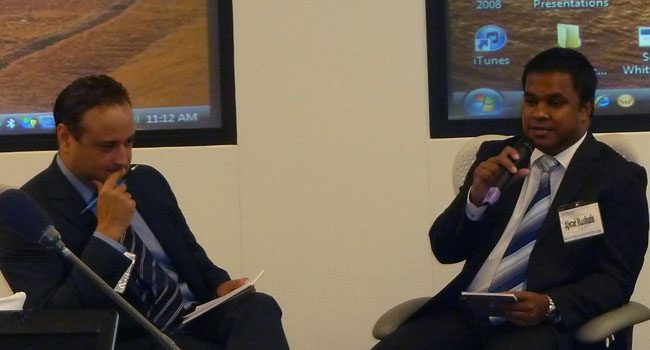
Deputy Director of Maldives Energy Authority, Mr. Ajwad Musthafa has participated as a speaker in the World Bank sponsored Energy Sector Management and Assistance Programme (ESMAP)’s Renewable Energy Resource Mapping Forum held in Washington DC, May 9, 2012.
This event facilitated sharing of knowledge and experience on the mapping of renewable energy resources. It brought together representatives from countries both interested in, and with experience of, carrying out resource mapping studies – alongside experts, service providers, and donor country representatives.
In his speech Ajwad highlighted the importance of renewable energy resource mapping to the Maldives, especially after the country has pledged to a low carbon growth to improve energy security and resilience to projected impacts of climate change.
Ajwad noted, as the Maldives lies within the equatorial belt, a region where substantial solar energy resources exist through out the year, and as the country is blessed with vast oceans, huge renewable energy potential exist in the region. However, lack of research and technical know how in this field resulted in very few assessments, which were not really sufficient for potential investors to rely on. Therefore, requested urgent technical assistance to Maldives in this field.
This forum also provided an excellent avenue for Maldives to highlight the difficulties and to tap future ESMAP support for RE resource mapping, including the possibility of a technical assistance.
In addition to the main event, World Bank also hosted a side event which provided an opportunity to learn about the following software tools developed by ESMAP’s to guide decision-making about climate change mitigation and low carbon growth. Such modeling and planning tools help generate consensus on data and assumptions among a wide range of stakeholders, and the outputs provide a valuable evidence base upon which to define priorities and design policy responses. These applications are available online from followings links.

http://esmap.org/esmap/TRACE
The Tool for Rapid Assessment of City Energy (TRACE) is a decision-support tool designed to help cities quickly identify under-performing sectors, evaluate improvement and cost-saving potential, and prioritize sectors and actions for energy efficiency (EE) intervention.

http://www.esmap.org/esmap/EFFECT
EFFECT enables governments to make decisions which encourage economic growth while reducing green house gas emissions. The tool helps governments embark on low carbon growth by assessing the impact of policy choices and providing transparent analysis of various development scenarios.

http://esmap.org/esmap/MACTool
MACTool (the Marginal Abatement Cost Tool) is a transparent and flexible software tool which provides an easy way to build marginal abatement cost curves, and calculate break-even carbon prices.




